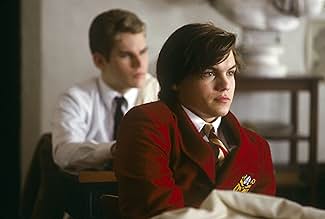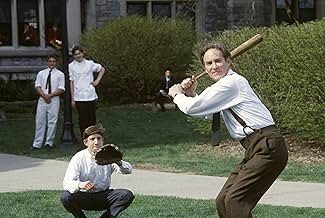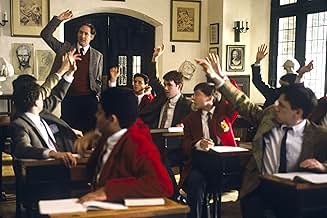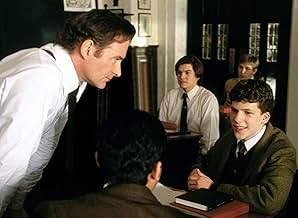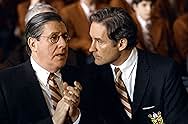IMDb रेटिंग
6.9/10
18 हज़ार
आपकी रेटिंग
अपनी भाषा में प्लॉट जोड़ेंAn idealistic prep school teacher attempts to redeem an incorrigible student.An idealistic prep school teacher attempts to redeem an incorrigible student.An idealistic prep school teacher attempts to redeem an incorrigible student.
- पुरस्कार
- 2 कुल नामांकन
Gabriel Millman
- Robert Brewster
- (as Gabe Millman)
फ़ीचर्ड समीक्षाएं
"The Emperor's Club" is a lot different than you would think. It does run a bit on cheesy sentimentality, but the ending is more than surprising considering the type of film this is.
It is a period-piece about a teacher (Kevin Kline) at a prestigious school for boys, and how he tries to "mould" a strong-willed fifteen-year-old boy. And if you want a hint at the surprise ending, don't read any farther, because I cannot control telling you that in the end he does not change the boy. Which is what truly amazed me. Most of the time in films like these, we see the free-spirited kid become proper and respectful. But not so here. This tale doesn't have a perfect teacher turning a bad boy into a perfect boy. It has a flawed teacher wasting years on one student. Years later at a party, he tells the boy, Sedgewick (now an adult), "as a teacher I have failed you." And that's what is so very different about this movie. It isn't as heavy on the drama as I thought it would be, and comes across a bit cheesy and fluffy at times, but the ending is more surprising than "The Sixth Sense" ever will be. It doesn't rely on tried-and-used methods, but goes for a new route. And just when you think that it's as depressing as it can get, the very, very end gives your spirit a bit of a boost.
Kline realizes that in those years that Sedgewick attended his class, he ignored the other students who were trying - and actually cared - about what they were doing. It kind of sheds a new light on the films where a teacher devotes time to one student in particular, because after seeing this film, I bet ten bucks next time you watch a film of the same roots you'll realize that the teacher is ignoring the other students. And "The Emperor's Club" exposes this. Kline's character is flawed, and while he is a good teacher, he makes mistakes, such as spending so much time on Sedgewick and bumping a smarter kid off of the school toga challenge, just so he can put Sedgewick in it (the challenge).
Kevin Kline isn't Otto here. "A$$hole!" is not a motto here. We've got Kline giving a thoroughly convincing performance as a 1970s all-boys school teacher. Kline's makeup at the end of the film is quite good as well, as opposed to something like "The Dish" where Sam Neil's makeup looks like it's about to fall off his face and his wig is about to be plucked off by a gust of wind.
I also liked the student actors in this film. The actors they got to play the various students were pretty good; in fact, many of them were very good. I hope their careers continue after this film, and as hateable as Sedgewick was in this film, the kid who played him was pretty convincing. You always know this when you start to like or dislike a character, much less hate or love them.
At the end of the film, I like the subtle differences in years. In the 1970s, a group of boys travel across a lake to check out the all-girls school, where nuns shoo them away. 28 years later, as Kline's character walks towards his schoolroom, we see boys and girls walking around. In 28 years society has changed, and it's funny to wonder if that group of boys from the 1970s ever thought that in 28 years, what they were paddling across a lake for would be right next to them.
It is a period-piece about a teacher (Kevin Kline) at a prestigious school for boys, and how he tries to "mould" a strong-willed fifteen-year-old boy. And if you want a hint at the surprise ending, don't read any farther, because I cannot control telling you that in the end he does not change the boy. Which is what truly amazed me. Most of the time in films like these, we see the free-spirited kid become proper and respectful. But not so here. This tale doesn't have a perfect teacher turning a bad boy into a perfect boy. It has a flawed teacher wasting years on one student. Years later at a party, he tells the boy, Sedgewick (now an adult), "as a teacher I have failed you." And that's what is so very different about this movie. It isn't as heavy on the drama as I thought it would be, and comes across a bit cheesy and fluffy at times, but the ending is more surprising than "The Sixth Sense" ever will be. It doesn't rely on tried-and-used methods, but goes for a new route. And just when you think that it's as depressing as it can get, the very, very end gives your spirit a bit of a boost.
Kline realizes that in those years that Sedgewick attended his class, he ignored the other students who were trying - and actually cared - about what they were doing. It kind of sheds a new light on the films where a teacher devotes time to one student in particular, because after seeing this film, I bet ten bucks next time you watch a film of the same roots you'll realize that the teacher is ignoring the other students. And "The Emperor's Club" exposes this. Kline's character is flawed, and while he is a good teacher, he makes mistakes, such as spending so much time on Sedgewick and bumping a smarter kid off of the school toga challenge, just so he can put Sedgewick in it (the challenge).
Kevin Kline isn't Otto here. "A$$hole!" is not a motto here. We've got Kline giving a thoroughly convincing performance as a 1970s all-boys school teacher. Kline's makeup at the end of the film is quite good as well, as opposed to something like "The Dish" where Sam Neil's makeup looks like it's about to fall off his face and his wig is about to be plucked off by a gust of wind.
I also liked the student actors in this film. The actors they got to play the various students were pretty good; in fact, many of them were very good. I hope their careers continue after this film, and as hateable as Sedgewick was in this film, the kid who played him was pretty convincing. You always know this when you start to like or dislike a character, much less hate or love them.
At the end of the film, I like the subtle differences in years. In the 1970s, a group of boys travel across a lake to check out the all-girls school, where nuns shoo them away. 28 years later, as Kline's character walks towards his schoolroom, we see boys and girls walking around. In 28 years society has changed, and it's funny to wonder if that group of boys from the 1970s ever thought that in 28 years, what they were paddling across a lake for would be right next to them.
I thoroughly enjoyed this movie. I don't care if others think it was predictable - so what? Wasn't Jaws predictable? How about Alien? Once in a while a movie has a lesson in it - like this one. Even if it is a lesson that gets played over and over.
I really didn't care for the mildly romantic banter between Kline's character and his female interest. Maybe the purpose of the character was to show Dr. Hundert was not gay - but that seems awfully shallow to me. If this movie was not about a gay teacher, why did the writer feel obligate to prove the reverse? All in all though, this was a GOOD movie - very good.
I really didn't care for the mildly romantic banter between Kline's character and his female interest. Maybe the purpose of the character was to show Dr. Hundert was not gay - but that seems awfully shallow to me. If this movie was not about a gay teacher, why did the writer feel obligate to prove the reverse? All in all though, this was a GOOD movie - very good.
10roghache
Perhaps teacher movies should be judged on their own merits, but it's human nature to compare. Although I also love Dead Poet's Society, I consider The Emperor's Club one of the most compelling movies I have ever seen. The two are actually worlds apart, with Emperor's Club definitely a more cerebral film. Dead Poets seems more student oriented (students shun conformity as a result of teacher impact) and Emperor's Club more teacher focused (teacher struggles to inspire challenging student and is faced with difficult choices). Also, they have very distinct themes, with Dead Poets focusing more on individuality and 'seizing the day', while Emperor's Club revolves around character and ethics. Unlike Dead Poets (and also Mona Lisa Smile), the Emperor's Club teacher has no controversial subject matter or approaches, just relatively traditional (though passionate & effective) teaching methods.
The story depicts Mr. Hundert, a highly respected and idealistic Classics professor at an ivy covered, prestigious boys' prep school, St. Benedict's. He tries to impart a passion for Greek & Roman history to his relatively motivated students, while also conveying the importance of principles and contribution to society. All passes smoothly until the arrival of Sedgewick Bell, the obnoxious and rebellious son of a slimy Senator (who neglects his 'nuisance' offspring and exhibits an unfortunate tendency to profanity). A battle of wills ensues between teacher and student, as Sedgewick not only disrupts the class himself but inspires rowdy disrespect among his classmates. Mr. Hundert sees the vast potential in this antagonistic student and makes every effort to motivate Sedgewick to apply himself to his studies and also to exhibit personal integrity. In the process, Mr. Hundert, himself a dedicated teacher with great integrity, neglects his other students to focus on the one. He illegitimately enables Sedgewick to participate as a finalist in the school's annual Mr. Julius Caesar Contest, secretly passing over the truly deserving student, Martin Blythe. A reunion 25 years later will depict the impact of this teacher's flawed choices on his former student's character and whether or not past injustices can finally be righted.
I don't want to give the outcome away, but this reunion provides a fascinating portrait of Mr. Hundert's students as grown men. We can examine the world's view of their success versus our own, witnessing their career choices, their wives & families, and especially their character traits...whether contributory and noble or self absorbed and dishonourable. Compelling glimpses of two of these student's offspring, Robert Bell and Martin Blythe IV, prove to be incredibly revealing.
Kevin Kline, an under rated actor, is masterfully convincing in the role of the scholarly, dignified, and conflicted Mr. Hundert, and his 25 year aging process seems well depicted. Also, the roles of the boys Martin, Louis, Deepak, and of course the unpleasant Sedgewick are all well cast, as well as their older versions.
This is not simply another great film about an extraordinary teacher who has a profound impact upon his students. What distinguishes this movie from the rest is that Mr. Hundert, though a wonderfully dedicated and moral teacher, is himself flawed and compromises his own principles. In some respects, this actually makes him a much more three dimensional, realistic, and compelling character than such previous exemplary teachers as Mr. Chips (Good Bye, Mr. Chips), Mr. Keating (Dead Poets Society), and Mr. Holland (Mr. Holland's Opus). The theme here revolves not only around Mr. Hundert's impact on the boys but also his inner conflict, actually more significant than any external struggle with the rabble rousing Sedgewick or the misguided system that focuses more on fund raising than academic excellence. The film makes the point that sometimes the moral choice is not always clear cut, that crossing an unethical boundary can appear all too justifiable, and that one unprincipled decision may lead to another. There is a subtly conveyed sense as to the extent that Mr. Hundert's unethical decisions have haunted him during the intervening decades and possibly even affected his subsequent career path, as he is passed over for the Headmaster's position and begins to question his own value as an educator.
The little sub plot is actually quite engaging (not irrelevant, as some claim) that portrays the potential romance between Mr. Hundert and Elizabeth, a lovely but married fellow teacher. Its purpose is to give another indication of Mr. Hundert's character and integrity, this time revealed through his personal life. Although these two are obviously close kindred spirits with a mutual attraction, he makes no attempt to move beyond platonic friendship. His emotional but restrained response is well conveyed when Elizabeth announces that she is moving to England with her husband, who has obtained a position at Oxford.
Personally, I found all the Greek & Roman History class scenes quite engaging and enjoyed the competition with its trio of toga clad contestants. It all made me wish I was a student myself in Mr. Hundert's Classics class, surrounded by all those busts of Cicero, Socrates, Plato, and Caesar.
The Emperor's Club is a unique, intelligent, and thought provoking film that contrasts society's misguided values with the truly meaningful and important. Very few movies today deal with ethical issues, but this one explores such moral matters as teacher favouritism, bending the rules, and cheating. It prompts discussion, encouraging the viewer to question his own views of right and wrong in these situations. The movie also challenges our thinking as to exactly what does constitute teacher success, as we watch Mr Hundert come to grips with his own personal definition. The quiet ending may be less intense and dramatic than Dead Poets Society, but is equally moving and powerful. As a former teacher myself, my hat goes off to Mr. Hundert. Although very human and with some lessons to learn himself, this dedicated teacher serves as an inspirational role model for viewers of this film as well as for his students.
The story depicts Mr. Hundert, a highly respected and idealistic Classics professor at an ivy covered, prestigious boys' prep school, St. Benedict's. He tries to impart a passion for Greek & Roman history to his relatively motivated students, while also conveying the importance of principles and contribution to society. All passes smoothly until the arrival of Sedgewick Bell, the obnoxious and rebellious son of a slimy Senator (who neglects his 'nuisance' offspring and exhibits an unfortunate tendency to profanity). A battle of wills ensues between teacher and student, as Sedgewick not only disrupts the class himself but inspires rowdy disrespect among his classmates. Mr. Hundert sees the vast potential in this antagonistic student and makes every effort to motivate Sedgewick to apply himself to his studies and also to exhibit personal integrity. In the process, Mr. Hundert, himself a dedicated teacher with great integrity, neglects his other students to focus on the one. He illegitimately enables Sedgewick to participate as a finalist in the school's annual Mr. Julius Caesar Contest, secretly passing over the truly deserving student, Martin Blythe. A reunion 25 years later will depict the impact of this teacher's flawed choices on his former student's character and whether or not past injustices can finally be righted.
I don't want to give the outcome away, but this reunion provides a fascinating portrait of Mr. Hundert's students as grown men. We can examine the world's view of their success versus our own, witnessing their career choices, their wives & families, and especially their character traits...whether contributory and noble or self absorbed and dishonourable. Compelling glimpses of two of these student's offspring, Robert Bell and Martin Blythe IV, prove to be incredibly revealing.
Kevin Kline, an under rated actor, is masterfully convincing in the role of the scholarly, dignified, and conflicted Mr. Hundert, and his 25 year aging process seems well depicted. Also, the roles of the boys Martin, Louis, Deepak, and of course the unpleasant Sedgewick are all well cast, as well as their older versions.
This is not simply another great film about an extraordinary teacher who has a profound impact upon his students. What distinguishes this movie from the rest is that Mr. Hundert, though a wonderfully dedicated and moral teacher, is himself flawed and compromises his own principles. In some respects, this actually makes him a much more three dimensional, realistic, and compelling character than such previous exemplary teachers as Mr. Chips (Good Bye, Mr. Chips), Mr. Keating (Dead Poets Society), and Mr. Holland (Mr. Holland's Opus). The theme here revolves not only around Mr. Hundert's impact on the boys but also his inner conflict, actually more significant than any external struggle with the rabble rousing Sedgewick or the misguided system that focuses more on fund raising than academic excellence. The film makes the point that sometimes the moral choice is not always clear cut, that crossing an unethical boundary can appear all too justifiable, and that one unprincipled decision may lead to another. There is a subtly conveyed sense as to the extent that Mr. Hundert's unethical decisions have haunted him during the intervening decades and possibly even affected his subsequent career path, as he is passed over for the Headmaster's position and begins to question his own value as an educator.
The little sub plot is actually quite engaging (not irrelevant, as some claim) that portrays the potential romance between Mr. Hundert and Elizabeth, a lovely but married fellow teacher. Its purpose is to give another indication of Mr. Hundert's character and integrity, this time revealed through his personal life. Although these two are obviously close kindred spirits with a mutual attraction, he makes no attempt to move beyond platonic friendship. His emotional but restrained response is well conveyed when Elizabeth announces that she is moving to England with her husband, who has obtained a position at Oxford.
Personally, I found all the Greek & Roman History class scenes quite engaging and enjoyed the competition with its trio of toga clad contestants. It all made me wish I was a student myself in Mr. Hundert's Classics class, surrounded by all those busts of Cicero, Socrates, Plato, and Caesar.
The Emperor's Club is a unique, intelligent, and thought provoking film that contrasts society's misguided values with the truly meaningful and important. Very few movies today deal with ethical issues, but this one explores such moral matters as teacher favouritism, bending the rules, and cheating. It prompts discussion, encouraging the viewer to question his own views of right and wrong in these situations. The movie also challenges our thinking as to exactly what does constitute teacher success, as we watch Mr Hundert come to grips with his own personal definition. The quiet ending may be less intense and dramatic than Dead Poets Society, but is equally moving and powerful. As a former teacher myself, my hat goes off to Mr. Hundert. Although very human and with some lessons to learn himself, this dedicated teacher serves as an inspirational role model for viewers of this film as well as for his students.
Klein was superb as the bookish teacher intent on molding boys' characters' as well as teaching them. When he went out of his way to aid a troubled student he wound up depriving another causing some concerns for his conscience. The boy he felt he should help was the son of a bigshot politico who had no clue as to the needs of his son. Too busy being a power broker this ass arrogantly claimed he would mold his son's character. How? He's seldom around and when he is there is no communication between himself and his offspring. Like so many fathers, I wonder why they even want children knowing there is no inclination to interact with them. Brings to mind the Harry Chapin song "Cat's in the Cradle" which speaks to many, many dads. The Emma Willard School provided a nice backdrop for a very good film. 4 stars.
There is no doubt that Kevin Kline is both a funny man and a fine comedic actor. However, as he has proved yet again, anything other than dramatic roles is a waste of his acting talent.
In the finest film he has made, he is superb in his role as school teacher and mentor to a generation of boys -- including one particular bad egg.
Excellently cast, scripted and acted, this is a must see.
In the finest film he has made, he is superb in his role as school teacher and mentor to a generation of boys -- including one particular bad egg.
Excellently cast, scripted and acted, this is a must see.
क्या आपको पता है
- ट्रिवियाWhen filming the movie, the location (Emma Willard school in Troy, NY) was still operating as a girl's school. Emile Hirsch reportedly complained about the students, claiming that they were pestering him for his phone number. He also (reportedly) said some unsavory things about the school in general. When the students heard about this, they demanded an apology from Hirsch, which he delivered in front of the entire student body. At the school viewing, whenever he appeared on screen, the girls booed loudly and stories about him still circulate through the student body.
- गूफ़When the girls are removing their shirts to go skinny-dipping, a Victoria's Secret Body by Victoria bra is revealed. That bra is from the time the film was made, not the mid-1970s when the scene takes place.
- भाव
William Hundert: As a great Aristophanes once wrote-- roughly translated-- "Youth ages, immaturity is outgrown. Ignorance can be educated and drunkenness sobered, but stupid... lasts forever."
- साउंडट्रैकFunk 49
Written by Jim Fox, Joe Walsh, and Dale Peters
Performed by James Gang
Courtesy of MCA Records
Under license from Universal Music Enterprises
टॉप पसंद
रेटिंग देने के लिए साइन-इन करें और वैयक्तिकृत सुझावों के लिए वॉचलिस्ट करें
- How long is The Emperor's Club?Alexa द्वारा संचालित
विवरण
- रिलीज़ की तारीख़
- कंट्री ऑफ़ ओरिजिन
- भाषा
- इस रूप में भी जाना जाता है
- The Palace Thief
- फ़िल्माने की जगहें
- उत्पादन कंपनियां
- IMDbPro पर और कंपनी क्रेडिट देखें
बॉक्स ऑफ़िस
- बजट
- $1,25,00,000(अनुमानित)
- US और कनाडा में सकल
- $1,41,18,751
- US और कनाडा में पहले सप्ताह में कुल कमाई
- $38,46,780
- 24 नव॰ 2002
- दुनिया भर में सकल
- $1,63,18,449
- चलने की अवधि1 घंटा 49 मिनट
- रंग
- ध्वनि मिश्रण
- पक्ष अनुपात
- 1.85 : 1
इस पेज में योगदान दें
किसी बदलाव का सुझाव दें या अनुपलब्ध कॉन्टेंट जोड़ें



